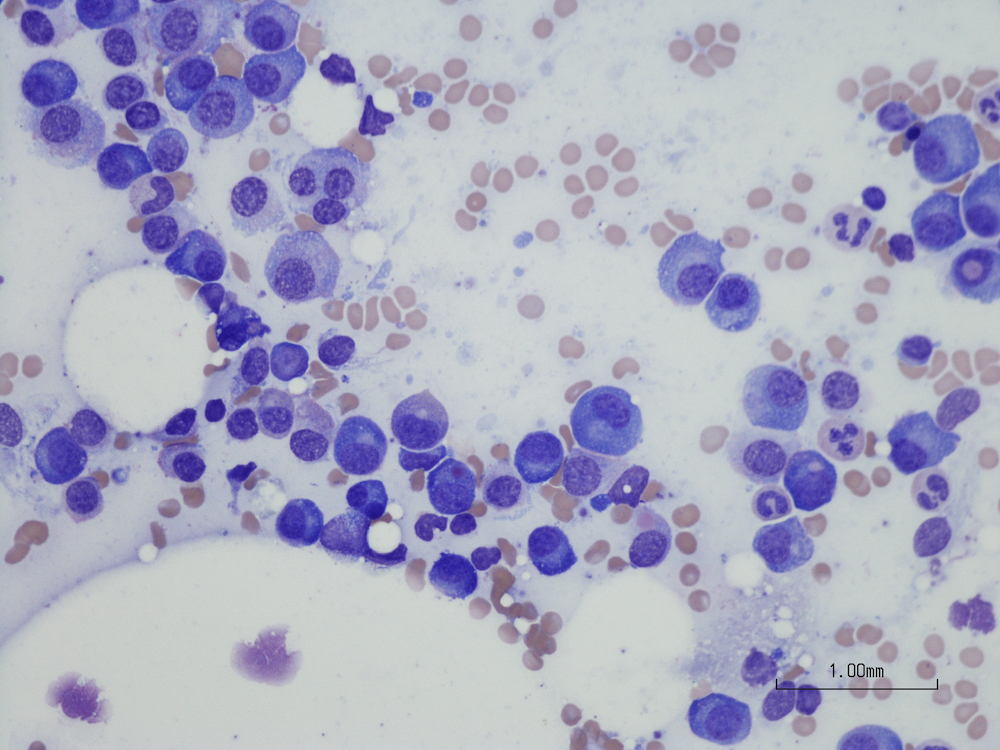FDA grants accelerated approval to talquetamab for patients with R/R multiple myeloma
On August 9, 2023, the U.S. Food and Drug Administration (FDA) granted accelerated approval to talquetamab, a GPRC5DxCD3 bispecific antibody, for adults with relapsed/refractory (R/R) multiple myeloma who have received at least four prior lines of therapy, including a proteasome inhibitor (PI), an immunomodulatory agent (IMiD), and an anti-CD38 monoclonal antibody (mAb).1,2
The approval of talquetamab is based on data from the Phase I/II MonumenTAL-1 trial (NCT03399799; NCT04634552), which included 187 patients who had received at least four prior lines of therapy. In this trial, patients received subcutaneous talquetamab at a dose of 0.8 mg/kg biweekly or 0.4 mg/kg weekly with step-up doses.1
In patients receiving 0.4 mg/kg weekly, the overall response rate (ORR) was 73% (95% CI: 63.2%, 81.4%), and the median duration of response (DOR) was 9.5 months. In those receiving 0.8 mg/kg biweekly, the ORR was 73.6% (95% CI: 63%, 82.4%) and the median DOR was not estimable.1 At a median follow-up of nearly six months, 58% of patients receiving 0.8 mg/kg biweekly achieved a very good partial response (VGPR) or better, with 33% of patients achieving a complete response (CR) or better. At a median follow-up of nearly 14 months, 57% of patients receiving 0.4 mg/kg achieved a VGPR or better, including 35% of patients achieving a CR or better.3
Regarding safety, talquetamab includes a warning for cytokine release syndrome (CRS) and neurologic toxicity, including immune effector cell-associated neurotoxicity syndrome (ICANS). Some of the most common adverse events (AEs) reported in the MonumenTAL-1 trial included pyrexia, CRS, dysgeusia, nail disorder, musculoskeletal pain, skin disorder, rash, fatigue, decreased weight, dry mouth, xerosis, dysphagia, upper respiratory tract infection, diarrhea, hypotension, and headache.3
At the 2023 American Society of Clinical Oncology (ASCO) Meeting held in Chicago, IL, we spoke with Paula Rodríguez-Otero, MD, PhD, University Clinic of Navarra, Pamplona, Spain, who discussed the findings from an analysis of the MonumenTAL-1 trial investigating the incidence of severe infections and parameters of humoral immunity in patients treated with talquetamab.
Dr Rodríguez-Otero states, “…what we have been able to see is that first of all, the overall incidence of severe infection is lower, around 20%, for the patients treated with talquetamab. Infections are more frequent in the first 100 days of therapy and then tend to decrease. If we analyze the B-cell populations, they were maintained consistently stable throughout the therapy with a tendency to increase in the B-cell populations after cycle seven… All suggesting that the use of GPRC5D-directed drugs, in this case, talquetamab, will lead to a better preservation of the B-cell immunity and eventually this may explain why the risk of severe infections is a little bit lower as compared to BCMA bispecific antibodies.”
This approval by the FDA provides healthcare professionals with a valuable novel option for adults with R/R myeloma and will benefit many patients with a high unmet medical need.
References
- U.S. Food and Drug Administration. FDA grants accelerated approval to talquetamab-tgvs for relapsed or refractory multiple myeloma. Available here. (Last accessed 11/08/2023).
- Chari A, Minnema MC, Berdeja JG, et al. Talquetamab, a T-Cell-Redirecting GPRC5D Bispecific Antibody for Multiple Myeloma. New England Journal of Medicine. 2022 Dec 15;387(24):2232-2244.
- Johnson & Johnson. U.S. FDA Approves TALVEY™ (talquetamab-tgvs), a First-in-Class Bispecific Therapy for the Treatment of Patients with Heavily Pretreated Multiple Myeloma. Available here. (Last accessed 11/08/2023).
Written by Anya Dragojlovic Kerkache
Edited by Thomas Southgate












